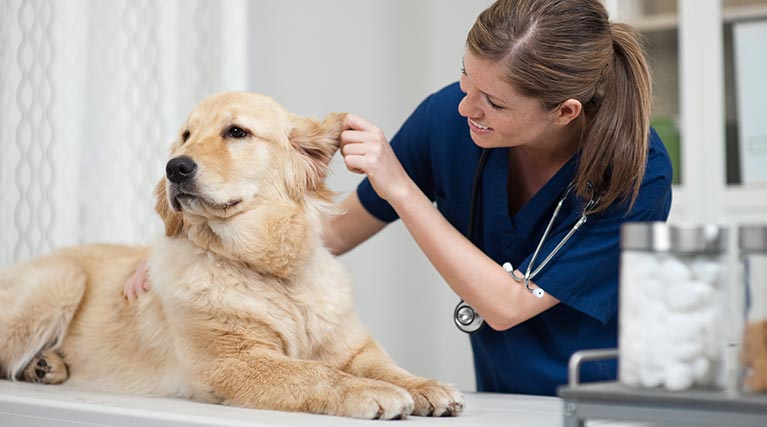Inoculation Standards From Your Trusted Vet
Vaccination standards given by your trusted vet play a crucial role in protecting your animal's health and health. Furthermore, attending to usual misunderstandings bordering injections can better boost family pet owners' confidence in these preventive steps.

Value of Vaccinations
Inoculations play a crucial duty in securing pet dogs versus a variety of avoidable diseases. By promoting the body immune system to identify and battle particular pathogens, vaccinations considerably minimize the incidence of infectious illness that can influence a pet dog's wellness and long life. Not just do vaccinations shield private pets, but they also add to herd immunity, consequently reducing the general frequency of diseases in the pet population.
Timely inoculations assist to reduce the spread of conditions such as rabies, parvovirus, and distemper, which can have extreme effects for both human beings and pet dogs. Vaccinations are usually a demand for boarding centers, brushing services, and pet dog parks, making them crucial for those who wish to mingle their animals.

Core Injections for Pet Dogs
While the particular vaccination needs of animals can vary based upon specific aspects, core injections are generally suggested to secure versus the most serious and common conditions (Pet Health Checkup). Core vaccines are those regarded crucial for all animals, regardless of their way of living or geographical place, as they secure against very contagious and potentially fatal ailments
For pet dogs, the core vaccinations include those for canine distemper, parvovirus, adenovirus (liver disease), and rabies. Adenovirus can result in liver condition, while rabies is a zoonotic disease that presents a threat to both animals and people.
In pet cats, core vaccines incorporate feline panleukopenia, feline calicivirus, feline herpesvirus (rhinotracheitis), and rabies. Feline panleukopenia is a very transmittable viral condition that influences the body immune system and intestinal tracts. Calicivirus and herpesvirus are major contributors to top respiratory system infections in felines, while rabies continues to be a crucial problem for public health and wellness.
Speak with your veterinarian to guarantee your pet dogs receive their core inoculations on timetable.
Non-Core Vaccines Explained
Non-core vaccines are customized to attend to certain dangers related to an animal's direct exposure, way of life, and environment to specific diseases. Unlike core injections, which are universally suggested for all animals, non-core vaccines are taken into consideration based upon specific conditions. These vaccinations are specifically crucial for family pets that might encounter special microorganisms because of their geographical location, traveling behaviors, or tasks.
Examples of non-core injections include those for Bordetella bronchiseptica, which is linked to kennel cough, and Lyme illness, triggered by ticks. Family pets that often interact with other animals, such as those in boarding facilities, pet you could look here dog parks, or brushing settings, may gain from Bordetella inoculation. If you live in a location where Lyme condition is common, immunizing versus this disease can be a prudent option for outdoor-loving canines.
Other non-core vaccinations may consist of those for leptospirosis, canine influenza, and feline leukemia, depending upon the specific risk factors existing. It is important to have a comprehensive discussion with your veterinarian concerning your pet's way of life and the prospective demand for these vaccinations, making sure a customized vaccination method that best protects your hairy friend.
Vaccination Set Up Summary

As pet dogs mature, it is very important to follow the suggested booster vaccinations. Emergency Vet. For grown-up animals, core vaccinations are typically given each to 3 years, relying on the details injection and you can look here local guidelines. Non-core vaccinations may be suggested based upon way of life factors and local condition prevalence, requiring a tailored approach
Routine vet examinations are essential for upgrading inoculation timetables. Your vet can supply support on the most proper booster shots for your animal, considering age, wellness status, and ecological threats. By staying aggressive and notified, pet dog proprietors can guarantee their furry buddies obtain timely and reliable inoculations, therefore safeguarding their wellness and well-being throughout their lives.
Common Misconceptions About Vaccinations
Misunderstandings about family pet vaccinations can lead to complication and reluctance amongst pet proprietors pertaining to the booster shot procedure. One widespread misconception is that injections are unneeded for indoor animals. While it holds true that indoor family pets encounter lower dangers, they are not entirely immune to diseases, as microorganisms can be introduced with different means, including human garments and other pets.
Another misunderstanding is that vaccinations can create the illness they intend to avoid. In fact, a lot of vaccines contain suspended or undermined pathogens, which can not cause condition in healthy pets. Some pet dog owners additionally believe that their family pets need to not be immunized if they are already healthy and balanced; nevertheless, inoculations are a positive measure that helps stop the start of health problem.
Additionally, lots of pet owners fear that vaccines will lead to long-lasting wellness issues. The benefits of vaccination-- securing pets from potentially life-threatening diseases-- much exceed the risks.
Conclusion
In summary, adherence to vaccination standards is vital for guaranteeing the health and longevity of animals. Resolving common myths bordering inoculations even more strengthens the importance of notified decision-making in family pet care.
Not just do vaccinations protect private animals, but they likewise contribute to herd resistance, consequently minimizing the general prevalence of diseases in the pet dog population.
False impressions about pet inoculations can lead to complication and hesitation among animal owners relating to the booster shot procedure. While it's real that interior family pets encounter lower threats, they are not completely immune to diseases, as virus can be presented through various means, consisting of human clothing and various other pet dogs.
Some pet proprietors additionally think that their animals must discover this not be vaccinated if they are currently healthy and balanced; nevertheless, vaccinations are a proactive step that helps avoid the start of health problem.
The advantages of vaccination-- safeguarding pets from potentially lethal diseases-- far outweigh the risks.